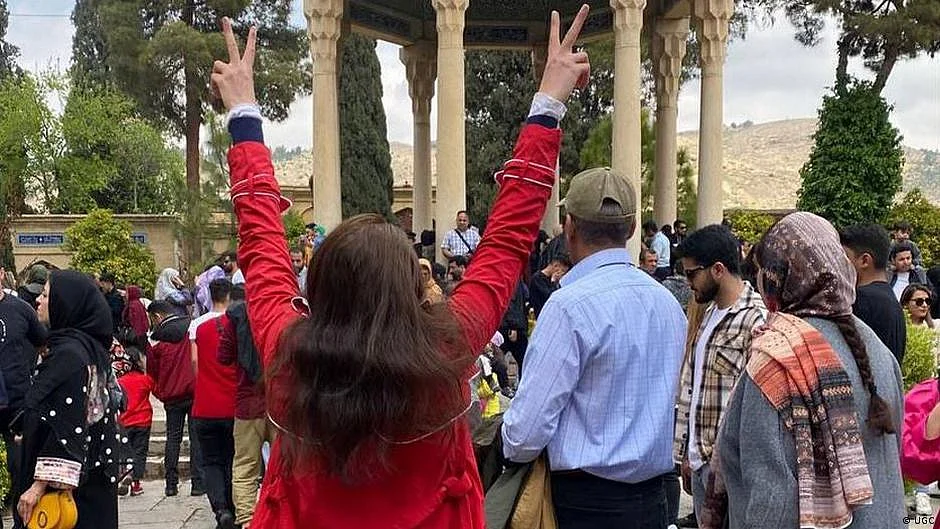Why is Iran reintroducing its 'morality police'?
Iran has resumed patrols by the so-called "morality police" to enforce its hijab law, which requires women to cover their hair and wear loose clothing in public

After nationwide protests last year and increasing numbers of women defying the headscarf law, the "morality police" had effectively disappeared from the streets of Iran. But the authorities have launched a new campaign to enforce the law. On Sunday, Saeid Montazeralmahdi, a spokesperson for the Iranian police, confirmed that both vehicular and foot patrols would be deployed. He was quoted by the country's official IRNA news agency as stating that the police would initially issue warnings to non-compliant women and refer those who "persist in breaking the law " to the judicial system.
In September last year, the 22-year-old Kurdish woman Mahsa Jina Amini died in hospital three days after being arrested by the "morality police" for wearing her hijab incorrectly. Her death, allegedly caused by maltreatment, sparked nationwide protests that shook the country for months. The authorities' violent response resulted in the deaths of hundreds. Many women refused to give in and increasing numbers dared to appear in public without covering their heads. In December, officials claimed that the "morality police" had been disbanded.
But recently there have been reports of its return by several journalists and social media users in the Iranian capital Tehran, and also other cities. On Sunday, a video began circulating on social media that captures the moment when dozens of passers-by intervened to prevent "morality police" officers from arresting three women in the northern city of Rasht.
'A failed project'
The Islamic republic has remained steadfast in enforcing its compulsory hijab policy, according to Azadeh Kian-Thiebaut, a sociologist at Paris Cite Universite, the Iranian regime has generally been resolute about enforcing the Islamic republic's hijab policy, which is seen to be a key pillar of the revolution that brought it to power. When it has faced public discontent, it has tried to rebrand and reinvent its methods of enforcement, she told DW.
In recent months, the government had started implementing facial recognition technology on public transport and had also shut down shopping malls, cafes and restaurants that admitted women without hijab. The authorities have also put pressure on taxi drivers to not accept women who are not covered. But Kian-Thiebaut said that these measures had not deterred women from refusing to comply with the law. "Compulsory hijab is a failed project," she said. "The Iranian women have defeated it and men have supported them."
Kian-Thiebaut said that if the "morality police" returned to the streets and the regime insisted on women wearing headscarves, there would a backlash and more tensions. She said that the current fundamentalist government could not impose its rule on "Iran's modern, diverse, and complex society" even if for Ali Khamenei, Iran's supreme leader, and his hardline supporters, more casual clothing was a sign of "cultural invasion" from the West.
This is particularly true amid the younger generation. DW reached out to a 25-year-old student in the city of Shiraz who goes by the pseudonym Mandana and started going out without a hijab in "safe areas" without a police presence about two years ago. In November, she stopped wearing a scarf altogether and did not even carry one in her bag just in case. "I did not want to go out at all today, but I changed my mind when I heard that the "morality police" was back," she told DW. In defiance, she said, she passed by a patrol without wearing a headscarf. "The officers just stood by and verbally warned me to cover my hair. They don't seem to dare to do more, knowing that we will fight them."
The law has also been criticized by some lawmakers, politicians, and even clerics who believe that whether to wear a hijab or not should be a matter of personal choice.
'Perpetual state of unrest and rebellion'
Kian-Thiebaut said that it was evident that there was a lack of general support for the current regime and Iran was in "a perpetual state of unrest and rebellion." She said that public resentment toward the government had been fueled by rising prices, high rates of unemployment, rampant corruption, and limited social liberties. Therefore, she suggested, the regime had no other option but to cater to the demands of the ultra-conservative minority that still supports it and this includes enforcing compulsory hijab.
Kian-Thiebaut's view resonates with what many have been saying on social media.
"The country has been under severe sanctions for two decades. The price of food is not stable even in the short term... The country has been involved in protests with hundreds of fatalities," wrote Mostafa Arani, a Tehran-based journalist, on Twitter. "Then, the police are tasked to force half of the citizens to wear a scarf on their head on a 40 degrees Celsius summer day, all because apparently this country's laws are based on a minority's interpretation of religion."
Distraction from corruption scandals?
The return of the "morality police" comes shortly after two investigations conducted by Iranian journalists revealed the involvement of top clerics in large-scale financial corruption and land grabbing and made headlines in Iranian print and online media. Among the clerics cited in the investigation is President Ebrahim Raisi's father-in-law, Ayatollah Ahmad Alam al-Hoda, who is widely known for his fundamentalist views.
"It is not unlikely that the return of the 'morality police' is related to efforts to cover up various other corruptions," wrote Homayoun Kheyri, a London-based journalist, on his Twitter account."The supporters of this incapable government are financially and organizationally backed by the religious establishment, which has a history of destabilizing the country. The law enforcement forces are also financially constrained, and injecting money enables them to organize such maneuvers."
Follow us on: Facebook, Twitter, Google News, Instagram
Join our official telegram channel (@nationalherald) and stay updated with the latest headlines
